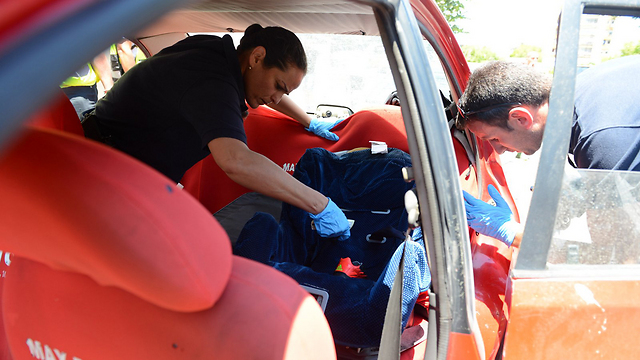
The directive issued by the state prosecutor presents three main types of wrongful deaths: in cases of vehicular accidents, the tendency would be to prosecute, but in cases where a child was forgotten in a car, the tendency would be not to prosecute.
In drowning cases, an indictment would depend on the level of the parent's negligence. The guidelines will also apply to other family members whose negligence caused the death or serious injury of their relatives.
According to Nitzan, the question of whether to prosecute parents who caused their child's death by negligence brings the prosecution face to face with one of its hardest dilemmas.
"On the one hand, it is the loss of a life due to negligent behavior. Because of the need to implement behavioral norms, there is public interest in prosecuting," he said.
"On the other hand, these are horrendous personal tragedies; there is a sense of loss, pangs of conscience, and often shame that accompany the parent throughout his life. In many cases, the child's death even causes a personal, familial, occupational and mental breakdown," Nitzan continued.
The state attorney concluded that a prosecutor considering indicting a parent for negligently causing his child's death should give weight to the harsh ramifications of the event on the parent when considering the "public's interest in prosecution."
In addition, weight should be given to considerations of personal deterrence and compensation in such grave cases, where the parent and the family have already been punished most harshly.
"However, against these unique considerations to avoid prosecution, there are counter arguments that may justify a parent's prosecution, at the top of which lies the advancement of appropriate behavioral standards and creating deterrence for the multitudes from life-endangering negligent behavior (such as negligent vehicular use; leaving a baby in the bathtub unattended; lack of sufficient monitoring over a child at a pool, at the sea, or in the vicinity of other body of water; leaving a child in a closed vehicle; etc.)," Nitzan continued.
Death by negligence of a parent in a traffic accident
A car accident in which the parent's negligence caused the death of a child has special characteristics.
However, Nitzan explained that the prosecutor must favor public interest when indicting, as part of road traffic safety, and especially due to the fear of recurrence of reckless and/or negligent driving.
"In these cases, it is necessary to revoke the driver's license for a period of several years or even permanently," he noted.
In addition, he wrote: "In accordance with the Criminal Procedure, submitting an indictment is mandatory. That said, the unusual circumstances surrounding the incident will come into consideration with regard to penalization."
According to him, "the decision to avoid prosecution will be implemented if the driver himself was seriously physically or mentally injured as a result of the accident; if we are discussing a lower rung of negligence on behalf of the driver; if the incident possess a relatively low level of public interest for prosecution due to his age, or medical condition."
The State Prosecutor also directed to take into consideration the person's age, his clean record, and personal and familial circumstances, as they were described in the probation report.
Leaving a child alone in the car: tragic event
Leaving a child alone in the car, which then leads to his death, may form a case of death by negligence. In most cases, and in the absence of contradictory evidentiary foundation, the case is a tragic event caused by distraction or lack of attention on behalf of the parent."In accordance with the general considerations—as in the case of a traffic accident—in case of the child's death, as a rule, a parent will not be prosecuted, except in a case of a high degree of negligence, such as leaving the child in the car with the intention of not returning for a substantial amount of time and then forgetting him, which would then be considered for prosecution due to the overall circumstances."
There might be circumstances in which the drowning occurred due to momentary lapse of attention, indicating a relatively low level of negligence. On the other hand, there may be circumstances in which the drowning occurred due to a high level of negligence.
So would be the case when a parent consciously walks into dangerous situations, such as a beach where swimming is prohibited; leaving a small child in the vicinity of a pool (or other body of water) unattended, and especially in a pool with no lifeguard; leaving a baby in a bathtub unattended and with no special contraption, etc.
As a rule, if the prosecutor declares low-level negligence, he must give significant weight to the harsh implications the child's death has on the suspected parent, and avoid prosecution.

















